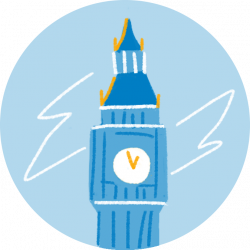
English language
English
English plays a key role in Duhovka. It is not solely a foreign language but also a language of communication and the language in which many classes take place.
We approach students individually; our curriculum is prepared for students coming from a traditional Czech elementary school as well as children with bilingual backgrounds. Lessons are taught by qualified native speakers as well as Czech teachers and the structure of the lessons reflects the needs of individual students. Classes are divided into two parts – EN (English Language) and ESD (English Skills Development) which complement each other.
English Language focuses on using English as a tool to communicate. This puts an emphasis on developing both receptive skills (reading and listening) and productive skills (writing and speaking). We also place emphasis on grammar, vocabulary, pronunciation and spelling. This is all incorporated into thematic units with an awareness of global issues.
English Skills Development focuses more on literature of various genres and styles (prose, drama, poetry and short stories). There is also an acknowledgment of cultural studies of English speaking countries and the principles of critical thinking, creative writing, presentation skills and the ability to state one’s opinion.
Duhovka’s goal for English is for all students to reach a level of bilingualism (being as comfortable with communicating in English as in their mother tongue) by the end of kvarta. This corresponds to the B2 level of the European Framework of Reference for languages. By the end of sexta the students’ knowledge should correspond to C1 level or above. There is also a desire for the students to be biliterate (being as comfortable with reading in English as in their mother tongue) by the end of this year. These goals of bilingualism and biliteracy should stand the students in good stead for an IB education for septima and oktava, as well as helping them to thrive in a modern, globalized world. When necessary, we provide extra language support to those students who need it in the form of extra study hours with a tutor.
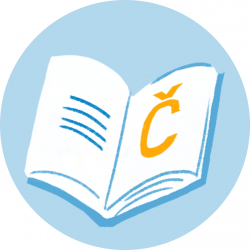
Czech language and literature
Czech Language and Literature
The course includes three disciplines - literary education, language education and communication and style education, which are interconnected.
The main goal is to develop students' cultivated spoken and written expression and communication skills. We emphasize reading and deepening the love of literature. Students work with different types of texts, learn to interpret them, formulate and argue their own opinions. They also develop the skills to search for, obtain and process information from multiple sources and create spoken and written expressions adequate to different communication situations.
Within IB study, students improve in the analysis and interpretation of literary works of various periods and genres, examine the aesthetic function of literary language, intertextuality and the relationship between literature and the world.
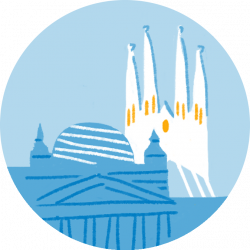
German and Spanish
German and Spanish
Our students start with a second foreign language in sekunda and they have 3 lessons per week. In higher grades, there are more lessons with native speakers focused primarily on the development of communication skills. The goal is not only to become proficient in the language but also to devote time to cultural studies of the relevant countries. After the first two years (in tercie), students reach level A1 according to the European Framework of Reference for Languages, in kvinta, level A2, and in oktava level B1+.
From septima onwards, in addition to the standard learning group, there is also a more advanced group, which consists of students with an increased interest in the language and who manage to complete the more demanding IB curriculum.
The four basic competences (speaking, listening, reading and writing) are deepened not only in regular language classes, but also in the offered optional courses - in kvinta and sexta the national history and geography of German or Spanish-speaking countries and Germanic or Hispanic culture;
In septima and oktava, students are offered an optional seminar and conversation lessons in German or Spanish which develop students’ language skills and prepare them for final exams or the IB diploma and university studies.
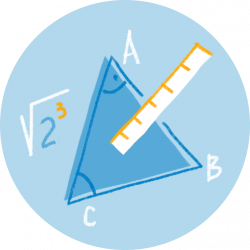
Mathematics
Mathematics
Math is a very important part of the Duhovka concept, both as a science and as a subject that develops abstract and analytical thinking and requires exactness of thought and expression. In lower grades, we use a number of materials that help students with visualization and transition from concrete objects to abstract concepts.
The focal point lies in mastering the strategy of problem solving. Students are encouraged to solve mathematical problems independently and improve their logical thinking skills. They learn to remember the most important information and derive everything else from it. They learn to argue in a logical and matter- of-fact way.
During their studies, they realize that having mastered math they have acquired tools important for studying other disciplines and for daily life. At the same time, math helps form some of the students’ personality traits, such as accuracy, studiousness, perseverance, diligence, and criticality. In the Middle School, we divide classes into smaller groups (similar to Czech Language classes) for one period, which further strengthens the individual approach to the students.
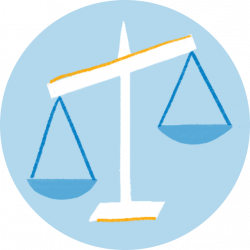
4Life and Social studies
4Life and Social studies
Civics is a space where students have the opportunity to learn about themselves, develop their work and study competencies, and work on interpersonal relationships within the classroom, school, family, and society. They learn about the environment they live in and are guided by its principles (from school rules to the basics of the rule of law). Students are encouraged to think about the economy.
In social studies classes, students present in various forms how they have come to understand often complex social phenomena. They learn to debate and find connections to events in the contemporary world and to their own lives. In practice, they learn how to participate in debate in a constructive and sophisticated way, even about more complex or controversial topics and to explain and defend their own or someone else's point of view. They also learn to distinguish and compare various arguments and their importance. They develop an ability to evaluate information and arguments and to take a position on the basis of this information while being aware of the possible consequences of their position. As part of media education, they learn about and create media messages themselves.
An important goal is peace education, which is at the heart of preventing racist and xenophobic attitudes. These objectives are aimed at educating citizens who will actively participate in a democratic society and who will be free and responsible people capable of critical thinking People who will not be easily manipulated and who are aware of their responsibilities and possibilities.
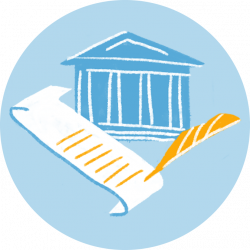
History
History
We see history as a means of developing critical thinking, thinking in context, and looking for examples and models for life. The goal of this subject is to learn to navigate history. This means to master basic historical terminology and to be able to classify historical facts, personalities, phenomena and processes in terms of time and space. Last but not least, our goal is to understand that history is always constructed in a specific historical context. That is what we call historical literacy.
Remembering facts and dates is not our goal but a means of understanding context and evaluating the meaning of historical events and personalities for today and the future. In lower grades, we focus mainly on historical phenomena (medieval regimes, travelling and trade, the Holocaust and human behavior). Higher grades focus on political history. From sekunda to sexta, half of the lessons are taught in English; in sekunda and tercie, classes are merged. From kvinta, students choose the teaching language themselves.
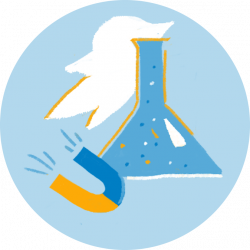
Science
Science
Science in Duhovka consists of Biology, Physics and Chemistry and focuses on a range of topics related to the exploration of nature.
Students learn about nature as a whole and admire how unique and perfect it is. They also have the opportunity to understand the importance of maintaining nature in balance for the existence of all living systems and realize how dependent man is on natural resources and how humans influence the state of our environment. Students use these findings to help protect nature and follow the principles of sustainable development.
Systematic use of research allows students to adopt important skills, such as to observe continuously and objectively, to experiment and measure, to keep records, to come up with and verify hypotheses, to analyze results and to draw conclusions from them. The natural sciences also support working with information resources and mutual cooperation between students, the development of logical thinking, the ability to ask questions and to research answers and solve practical problems.
In sekunda and tercie, Biology, Physics and Chemistry are merged into one subject – Integrated Science – and students choose a different project every month.
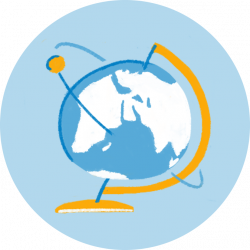
Geography
Geography
Our goal is to introduce geography as an interesting subject which integrates a number of fields and provides them with a spatial aspect. Moreover, we want to awaken or support student interest in discovering the world. Students learn to ask geographical questions: where is it located?; why is it there?; how did it come into being?; how does it influence the environment?; what is the relationship between its location and that of other geographical objects?
Students master the ability to find, classify and analyze geographical information; to use maps, graphs, texts and photos; to systematically research, collect, and process information from various resources; to evaluate their quality and value and to be able to interpret them. They develop their ability to think critically, to assess and compare territorial changes, social and economic phenomena, and processes in space.
In sekunda and tercie, classes are merged together and half the classes take place in English (one of the two terms).
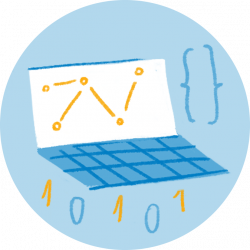
ICT
ICT
We feel that information technology is an important tool for grasping today’s world. Lessons build information literacy, or the ability to research relevant information and process it efficiently. Working with information technology is not limited to this subject only – it pervades all subjects taught at Duhovka.
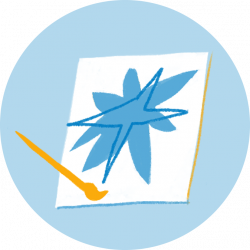
Esthetic Education
Esthetic Education
Esthetic Education gives students another way of exploring the world than just the rational one and it reflects an indispensable part of human existence – art and culture.
We organize Esthetics as a six-year course consisting of two parts. In prima to kvarta, students attend obligatory Art and Music. In both of these areas, English is used in class. In prima and sekunda, a native speaker cooperates with the Czech teacher in Art. In tercie and kvarta, Music lessons are in English only.
In kvinta and sexta, students choose Music, Art or Drama each term, Photography, or Arts and Crafts. Music and Drama is taught in English; Art, Arts and Crafts and Photography are taught in Czech. Both grades are merged and at the end of each term there is a public performance organized.
In septima and oktava, students may take an optional seminar in art history. For IB students, there is a two-year Visual Arts course that deals comprehensively with three major components: the context of visual art, its methods, and last but not least, its communicative possibilities. Students expand their theoretical knowledge and develop their practical and curatorial skills, while continuously recording their artistic experiments and experiences in their diaries. The whole course culminates in an exhibition, a final portfolio and a theoretical comparative study.
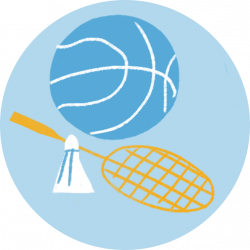
Physical Education
Physical Education
We lead all students (regardless of their individual dispositions) to experience the joy of movement and playing games and thus build a permanent positive relationship with sports and other forms of physical activity.
In PE, students integrate skills and habits which give them the chance to refine their own personality and to responsibly take care of their own bodies. Regarding evaluation, we focus on the students’ activity, their progress from the beginning to the end of a cycle and between individual years of study. We always compare progress and improvement with prior results, not other students.
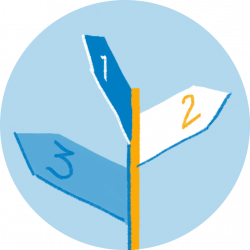
Optional Subjects
Optional Subjects
From tercie on, students have the chance to be the creators of their own educational path through their choice of optional subjects. The choice of optional subjects changes every year and consists of a wide range of activities which help students deepen their knowledge and basic-level skills gained in regular lessons or to devote their time to activities that cannot be part of the regular schedule as there simply is not enough time available. In septima and oktava, seminars prepare students for final exams and further studies.